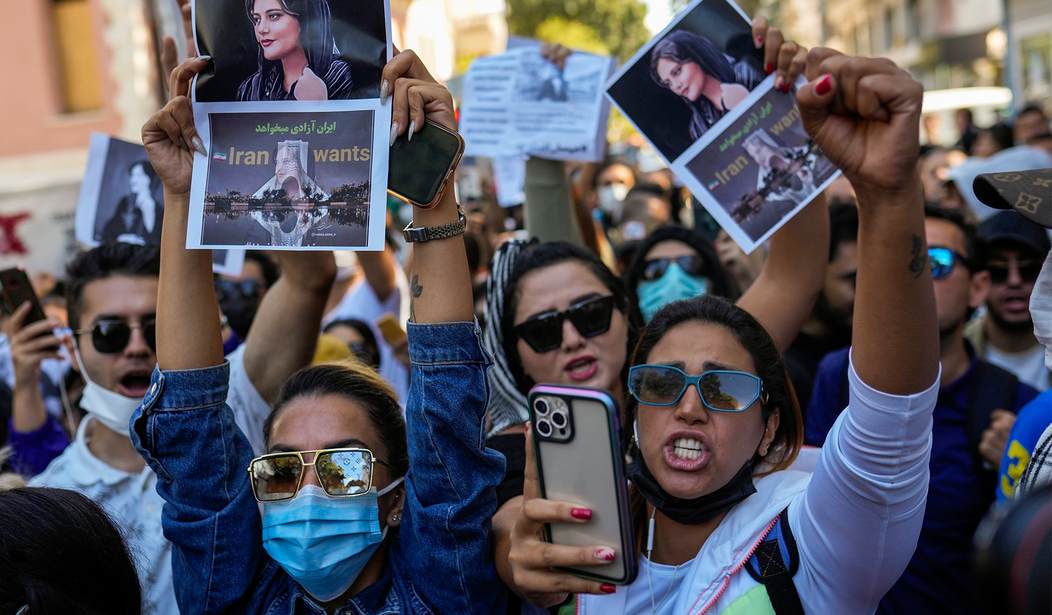As an Iranian American, I take pride in the opportunities my host country has provided me in every sense, but I am also proud of my Iranian heritage. I have often found myself explaining to my American friends, colleagues, and neighbors that Iran's rich heritage and civilization are not synonymous with the ayatollahs and their ideology of bigotry, vengeance, and terror. This sentiment has become increasingly evident over the past seven months, as Iranians from all walks of life and age groups have taken to the streets, calling for the overthrow of the clerical regime and its intolerant ideology. This unprecedented period of unrest and unfortunately the indiscriminate oppression and waves of executions that have followed show that we are witnessing perhaps the greatest challenge yet to the mullahs' weak hold on power.
Sadly, at least 140 prisoners, including three young protesters have been hanged in Iran since April 21. Despite the regime's brutality, there is new hope in the Iranian-American community for brighter days ahead. Like me, most Iranian-Americans believe that big changes are within reach for Iran, but there are also new challenges on the horizon. One question on many minds is what the future holds for Iran without the ayatollahs. Some, including Reza Pahlavi, the son of the last self-anointed Shah of Iran who was deposed by a massive popular revolution in 1979, have pushed the narrative that the collapse of the existing theocratic system should lead to Iran reverting to hereditary monarchy.
However, it is clear from videos of the protests that Iranians are calling for a democratic republic, rejecting both the current and former dictatorships. Young and old, representing various ethnic and religious backgrounds, Iranians have been heard chanting, "Death to the dictator, whether the Shah or the Supreme Leader." Despite the regime's ruthless crackdown on protesters, killing at least 750 and arresting over 30,000 dissidents, the public remains committed to regime change and is opposed to whitewashing the Shah's criminal legacy. These chants have continued to be heard in various localities even after the regime and certain international media began reporting that the uprising was over.
Recommended
The Shah's legacy includes decades of violent repression which ultimately set the stage for similar trends under the new regime after Mohammad Reza Pahlavi was overthrown and a cleric named Ruhollah Khomeini staked his claim as first supreme leader of a new, theocratic dictatorship. Furthermore, by imprisoning and killing thousands of activists and dissidents, the Shah’s regime effectively guaranteed that none of the country’s pro-democracy opposition figures would be in a position to challenge Khomeini’s presumptive leadership after he returned from exile in France.
The imprisoned pro-democracy leaders were a much better representation of the Iranian people’s thinking and vision. Support for Khomeini’s fundamentalist principle of velayat-e faqih, or “guardianship of the jurist,” was negligible in the immediate aftermath of the 1979 revolution and has only diminished since. But the mounting grievances and disillusionment with such a system have not prompted people to regret the 1979 revolution. It has only deepened the underlying hatred of the Shah who practically facilitated Khomeini's rise to power in the first place.
The goal of the latest uprising is the same as the goal that the overwhelming majority of Iranians had in mind in 1979, namely the establishment of democratic rule and a legal framework for the basic freedoms that we in the US take for granted; freedoms that have been trampled on in successive dictatorships over a period of nearly one hundred years.
The people’s goal is clearly expressed in the ten-point plan for Iran’s future authored by the opposition leader Maryam Rajavi and the coalition of pro-democracy opposition groups known as the National Council of Resistance of Iran (NCRI). At a Congressional Iran Women Caucus recently, Reps. Nancy Mace (R-SC) and Sheila Jackson Lee (D-TX) led a hearing which examined the details of that democratic plan as well as ways the U.S. can support the Iranian people. Joining them were Reps. Tom McClintock (R-CA) and Steve Cohen (D-TN), co-chairs of Iran Human Rights and Democracy Caucus, plus several other members from both sides of the isle.
In the wake of eight months of continuous unrest, it seems as though the opportunity for this transitional body to step into that role is very near at hand. In fact, the defining slogans of the recent uprising are closely associated with a network of Resistance Units that have been operating inside Iran under enormous duress since 2014. The prominence of those slogans in recent years has been a clear symbol of the entire activist community’s embrace of this platform. Across the globe, similar endorsements for this framework are seen from a wide variety of lawmakers and foreign policy experts throughout Europe and North America, including the majority of members of the US House of Representatives.
It is time to debunk the notion that the only choices for that vital and strategic country are to retain the theocracy or return to the monarchy. The Iranian people have proven that they are ready for a democratic, republic government to be ruled by the people, for the people. This is the Iran that we should all support as Americans.

























Join the conversation as a VIP Member